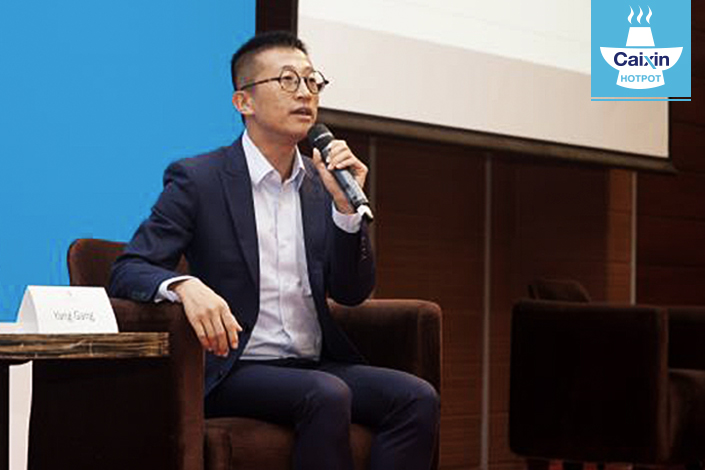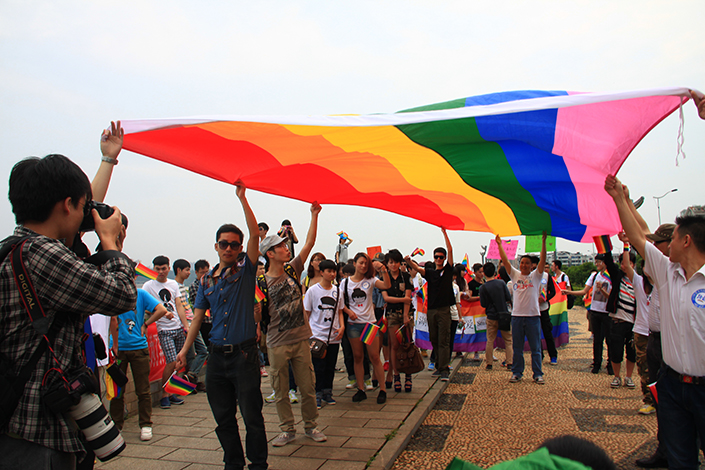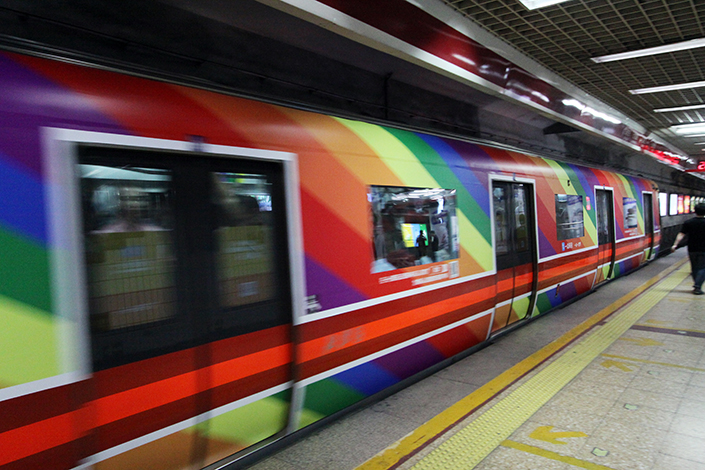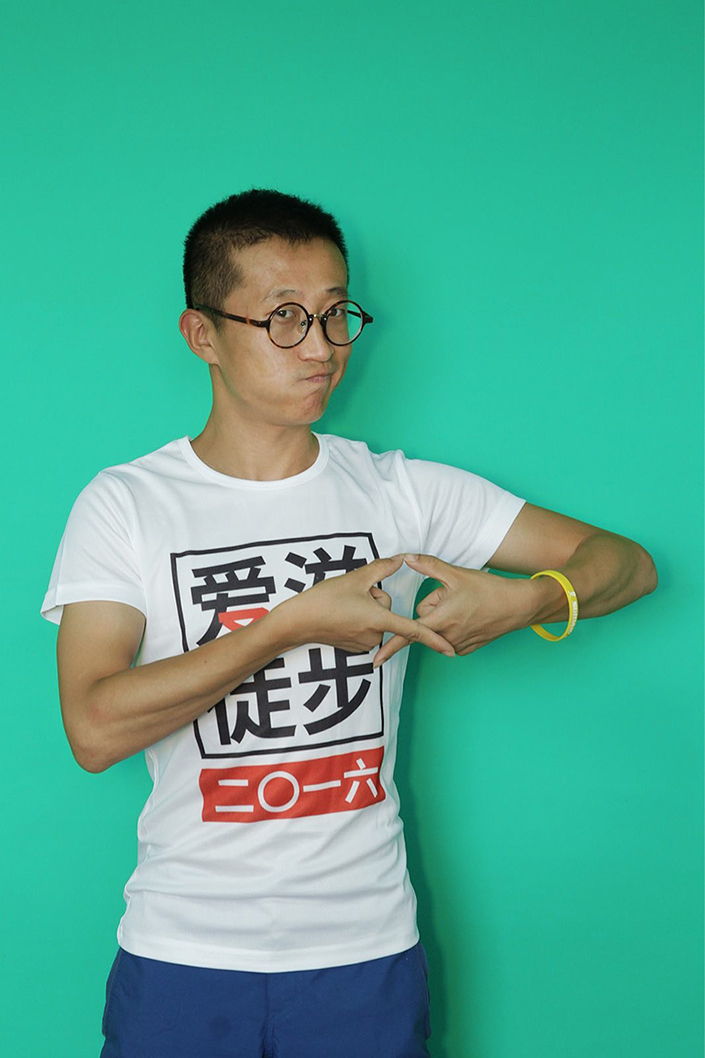Do LGBT-Friendly Businesses Herald Greater Rights in China?

As China’s sexual minorities start flexing their economic muscles and social media allows more people to have their voices heard, public perceptions on lesbian, gay, bisexual and transgender (LGBT) issues are changing, a leading rights activist in Beijing said.
“The private sector has begun to show their support toward LGBT causes,” said Martin Yang, sustainable development manager from Beijing Gender, one of China’s oldest LGBT nongovernmental organizations (NGOs), which launched Beijing’s first gay hotline in 1997. “There were a few very famous advertisement campaigns recently. It’s actually good, because they can reach out to more people than NGOs can. They’re trying to find a niche market, which is good. At least they are doing some visibility work.”
With 70 million LGBT individuals in China, the country’s pink economy is worth $300 million, according to a 2016 China LGBT Community Report done by the Chinese homosexual dating apps Blued and Rela, along with the public relations agency Weber Shandwick.
Meanwhile, major media outlets in the country have drastically increased the amount of positive or neutral commentary about LGBT subjects, according to Yang. “We can see there is a clear trend where state media and other mainstream media narratives are changing,” he said.
This is despite a 2016 ban on portrayals of homosexuality on TV series. China’s industry group for online broadcasting, China Netcasting Services Association, took this ban a step further by prohibiting the depiction of homosexuality, including it in the category of “abnormal sexual behavior” alongside incest and sexual violence.
 |
A total of 105 volunteers from 14 provinces joined a street campaign promoting gay rights in Changsha, Hunan province, in May 2013. Photo: IC |
A United Nations report in 2016 shows that only 15% of lesbian, gay, bisexual, transsexual and intersex individuals in China have chosen to come out to their close family members. Pressure to get married, particularly in smaller cities and rural areas, have spawned a culture of “cover marriages,” where a gay man “dupes” a heterosexual woman into marriage. Another phenomenon that has been on the rise is Xinghun, or “lavender marriages,” where both the husband and wife are gay or bisexual.
“Gay people also share online that they feel obligated to bring a child back to show to their families. Adoption law is, however, very strict,” Yang said.
 |
Martin Yang, born in Inner Mongolia, has been a member of the Beijing Gender team since 2014. While studying at Sun Yat-Sen University in Guangzhou, known for being a seat of activism for gay rights, he was involved in advocacy work in other fields. “I actually worked in the nonprofit sector, but not particularly on LGBT-related subjects, (such as) the environmental field and children’s healthcare field for seven years.” After receiving a research grant through the Asia Pacific Leadership Program at the East-West Center in Hawaii in 2014, he helped map the LGBT “ecosystem” in Southeast Asia and China. Following this, he returned to Beijing three years ago to further involve himself in advocating LGBT issues in China.
“I do see (positive) steps being taken within the greater China area. It’s not easy, but we have to find a way to change perceptions,” he said in a recent interview with Caixin.
The following are excerpts of that interview, in which Yang talked about the rise of the pink economy, in which businesses cater specifically to LGBT customers. Yang also discussed why surrogacy is only an option for the “LGBT elite” and how the community managed to thrive despite certain restrictive government rules.
 |
A rainbow subway car passes through a Line 1 subway station in Beijing in September 2015. A gay marriage proposal took place on the train, which an online news outlet paid to have painted as part of an advertising strategy. Photo: IC |
Yang: I have a few observations. First, I think, the media’s perception has been changing. But, still a large majority of the reporting is related to homosexuality, not LGBT. (The latter term) is not only about homosexuality, but it’s covering transgender and bisexual people as well. When you think of homosexuality usually, you think of gay men and everyone else is left out. Next, companies — particularly the private sector — have begun to show their support towards homosexuality. There were a few very famous advertising campaigns launched by private companies. It’s actually good. They can reach out to more people than NGOs can. The business world has started picking this up. They want to catch up. Maybe they want to “pink wash” themselves, or they want to be opportunistic. They’re trying to find their niche market, which is good. At least they are doing some visibility work.
What kind of companies?
If I can remember Alipay (once owned by Alibaba Group Holding Ltd.), one day they had this opening or landing page image on their app changed to (two) gay men. In the picture, it was a guy holding up another guy and the Chinese text that accompanied it was a play on words that was a reference to homosexual slang. Once people read it they were amused. There was also DangDang, a bookselling platform, like Amazon.com. In 2016, they put two homosexual couples on their ad campaign. So businesses are doing something.
Let’s go back to the issue of gay culture in contemporary China…
For the younger generation, I think it’s very common for them to know homosexuality. They have come across this topic at least once in their studies. They may have very different opinions about the subject. But of course, they have heard about it. Twenty or 30 years ago, it was taboo. No one talked about it. So that’s progress. Urban cities to me are more open than the rural areas. In rural areas… it’s not whether they are either for or against homosexuality, instead it’s just not part of their daily lives. Another observation is on the recent regulation issued by one of the associations in public media saying that homosexuality is abnormal and it cannot be depicted online. Once that regulation came out, there was a very interesting story going around in the LGBT community. A lot of people who used to be closeted or didn’t show their gay side on social media started saying things, speaking up. They would forward articles that discussed the regulation. What I saw, was that it might have triggered the formation of an LGBT community in China.
 |
Martin Yang also manages the China Aids Walk, an annual event that seeks to raise money and awareness about HIV/AIDS issues. Photo: Beijing Gender |
You mentioned companies were trying to “pink wash” their products or services. What does this mean?
Pink washing is similar to the term “green washing.” Some companies want to show that they are really embracing, welcoming, targeting or catering to their LGBT customers, but actually they only want their money. They only want to use this as advertisement fodder. So they put money in it, and then say they we are very pro-LGBT, but actually they may not be. So that’s what we call “pink washing.” It’s still early to see who is pink washing in China, but it’s good to have a term to define the practice.
You said social media has helped create a sense of community among people who have identified themselves as LGBT. How big are China’s LGBT chat communities? Do they tend to cover all of China or concentrate on a few major cities?
The size and geographic distribution of Chinese LGBT chat communities should be similar to the population group of people who have identified themselves as LGBT or at least LGBT-curious. I am afraid no specific number can be found anywhere as far as I know, but it must be in the tens of millions and cover all of China, judging from information released by LGBT dating apps and NGOs. Active LGBT NGOs, if understood in the broader sense, can be found in all major cities across China. Though the majority of these NGOs are still small and struggling, cooperation with each other is not only very common, but also in many ways essential.
Meanwhile, I think the mobile internet and smartphone applications are connecting people. Some gay apps that I am aware of besides Blued: Aloha, Fanpaizi and Ananda. Blued of course is the biggest and is mainly used for Chinese users, or whoever wants to be communicating in Chinese. I believe they welcome females, but there aren’t that many on there. There are at least three lesbian dating apps in China. For lesbians, I heard there are LesDo, Rela and LesPark. To me it looks like a fierce market. Social media platforms like WeChat and Weibo are also good for information sharing. A lot of our educational campaigns go through these social media channels.
It seems that homosexual men receive most of the media coverage. How is it for homosexual women in Beijing, or China as a whole?
I’m not an expert on this, but during my conversations with my lesbian friends, I learned a few things. Lesbian women suffer. They have more social burdens on their backs. Because they are women, they are generally disadvantaged in society. They don’t have bars like gay men do that are obvious to find. Their places are more secret. I’ve been to one or two lesbian bars. A friend took me. It’s very interesting. I believe they try to keep it discreet. I have lesbian friends who are very proud of themselves coming out to their friends. But I also have lesbian friends who are closeted. In Beijing, it’s a mix.
How have social pressures, particularly from one’s family, or homophobia, changed in the last couple of years?
When I think of family, it’s usually the parents. Sometimes grandparents will play a role, but for people who have migrated to big cities, parents are the biggest force. The challenges from parents’ beliefs or social norms are that a person should first get married and second, procreate … babies. I think these are the two golden rules Chinese people are raised with. So for LGBT people, it’s a lost spectrum. For them, getting married or finding a partner is a big challenge. I’m sure you’ve heard of sham marriages, cooperative marriages (between a gay man and a lesbian) and unfortunately the wrong marriages of going into a straight relationship.
Since going on a cruise with LGBT parents … I realized the environment is changing. It has become easier for parents to accept. Of course, it’s not that simple. NGOs are working very hard to help parents and children work this out. Another trend is that when parents are OK with their children being gay or lesbian, they still want them to get married. They don’t expect them to get married with a straight person, but they do hope they can find another person of their choice and be a couple. This is very interesting. This summer, some parents in Shanghai went into a park to help their children find partners, though it was part of a campaign. But it also represented something more, they were trying to find a date for their homosexual children. (The gathering was dispersed by police after a few hours.)
The second pressure is about making babies. I have friends who really want to have their own children, so they opt for surrogacy. A lot of parents want to see grandchildren. In China, I don’t see a strong preference between male and female children among gay couples. They just want a baby. Gay people share online that they feel obligated to bring a child back to show to their families. Adoption law is, however, very strict.
Is surrogacy a popular option?
Surrogacy mainly happens outside of China. But, it’s very expensive. Only “super elites” amongst the LGBT people can afford to have a baby through a surrogate mother. It’s definitely not that easy.
What methods are used to raise awareness and acceptance of LGBT issues in China?
We work closely with media, especially mainstream media in China. We provide information, context and basic knowledge through workshops and interviews. We also talk to the younger generation face to face or we support them to conduct their own activities. This gives us more ground to carry out HIV/AIDS prevention projects inside their schools. We have a project called Queer Comrades. It’s one of our long-term video projects. We make films, short videos, news of our own and we also train young people to make their own videos. This is in itself a way for social media to influence mainstream media.
What is your opinion on where China’s culture is headed in future?
I do feel positive about being homosexual and in the future LGBT individuals will be more accepted by society. But there is a long way to go. It is very important to let (LGBT) people feel OK about themselves. I believe that is the first step. The community may also want to get equal marriage or surrogacy rights. Before we can do something, we have to be more visible. We also have to continue with public education. People-to-people communication must continue. Usually, when some people think they are against homosexual people, they think they’ve never seen one in their life. That’s usually because no one came out to them. It is rare in big cities to never have a gay or LGBT friend. So, we push for more people to interact with each other, and find ways to talk about LGBT related subjects. I do see within the greater China area steps being taken. It’s not easy, but we have to find a way to change the perception.

- PODCAST
- MOST POPULAR







